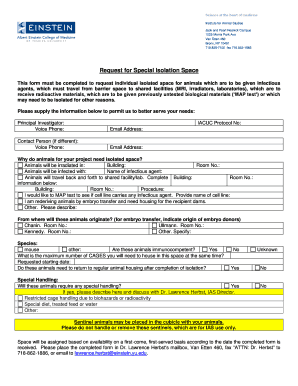
Get Institute For Animal Studies
How it works
-
Open form follow the instructions
-
Easily sign the form with your finger
-
Send filled & signed form or save
How to fill out the Institute For Animal Studies online
Filling out the Institute For Animal Studies form is an essential step in requesting special isolation space for animals treated with infectious agents or biological materials. This guide will help you navigate the process clearly and effectively.
Follow the steps to complete your request for special isolation space.
- Press the ‘Get Form’ button to access the document and open it for editing.
- Begin by entering the name of the Principal Investigator in the designated field.
- Provide a voice phone number for direct communication regarding the request.
- Enter the email address of the Principal Investigator to facilitate electronic correspondence.
- Insert the IACUC Protocol Number in the section provided.
- If a different contact person is involved, fill out their name, voice phone number, and email address.
- Explain why animals for your project require isolated space in the specified area.
- Indicate the building and room number where the animals will be housed.
- Specify the location where animals will undergo irradiation.
- List the name of the infectious agent the animals will be exposed to.
- Detail any substances the animals will be infected with, including room number and procedure.
- If requesting a MAP test, provide the name of the cell line to be tested.
- Indicate if you are rederiving animals and require housing for recipient dams, and describe any other special needs.
- State the origin of the animals for embryo transfer, specifying details for each location.
- Select the species from the provided options.
- Specify if the animals are immunocompetent by selecting Yes or No.
- Enter the maximum number of cages needed for housing these animals.
- Indicate the requested starting date for the isolation.
- Specify if the animals need to return to regular housing post-isolation by selecting Yes or No.
- If the animals require special handling, supply detailed information regarding those needs.
- Complete the form by ensuring all required fields are filled in and no necessary information is omitted.
- Submit the completed form by placing it in Dr. Lawrence Herbst’s mailbox, faxing it to 718-862-1886, or emailing it to lawrence.herbst@einstein.yu.edu.
Complete your request for special isolation space online today.
The 3 R's in laboratory animals consist of Replacement, Reduction, and Refinement. This framework encourages researchers to seek alternatives to animal use, minimize the number of animals utilized, and enhance their care and handling practices. The Institute For Animal Studies provides guidance on implementing these principles effectively in research protocols. By adhering to the 3 R's, researchers can conduct ethical, impactful studies that respect animal welfare.
Industry-leading security and compliance
-
In businnes since 199725+ years providing professional legal documents.
-
Accredited businessGuarantees that a business meets BBB accreditation standards in the US and Canada.
-
Secured by BraintreeValidated Level 1 PCI DSS compliant payment gateway that accepts most major credit and debit card brands from across the globe.


